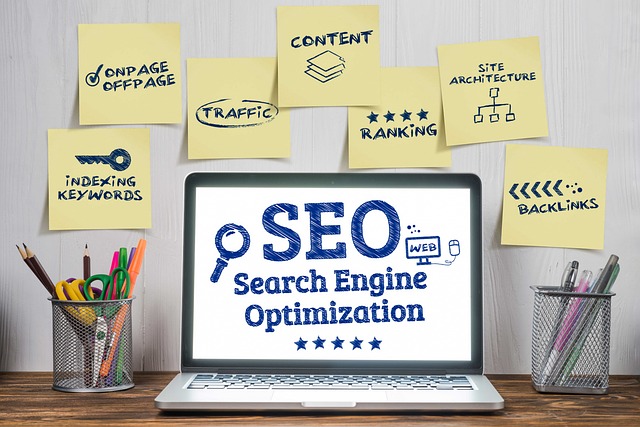Search Engine Optimization (SEO) is vital for e-commerce growth, driving visibility, traffic, and sales through keyword research, on-page optimization, user experience enhancement, high-quality backlinks, and analytics. Understanding and leveraging these benefits of Search Engine Optimization are key to successful online business strategies in a competitive market.
In today’s digital landscape, the benefits of Search Engine Optimization (SEO) are invaluable for e-commerce growth. This article explores how SEO drives traffic, boosts product visibility, and enhances user experiences, ultimately leading to increased sales. We’ll delve into crucial aspects such as keyword research, on-page optimization, and building quality backlinks. By understanding these strategies, you can navigate the ever-changing SEO landscape and stay ahead of the competition.
Understanding SEO's Role in E-commerce

Search Engine Optimization (SEO) plays a pivotal role in driving e-commerce growth by enhancing online visibility and attracting potential customers. In today’s digital landscape, where consumers heavily rely on search engines for product discoveries, SEO becomes an indispensable tool for businesses to thrive. By optimizing websites with relevant keywords, high-quality content, and structured data, e-commerce brands can significantly improve their search rankings, making them more discoverable and credible in the eyes of customers.
The benefits of SEO for e-commerce are manifold. It increases organic traffic by improving website visibility on search engine results pages (SERPs), which leads to higher conversion rates. Well-optimized pages tend to earn more clicks, build brand authority, and foster customer trust over time. Additionally, SEO enables businesses to target specific demographics and interests, ensuring marketing efforts reach the right audience. Ultimately, a robust SEO strategy is essential for long-term success in the highly competitive e-commerce arena.
Driving Traffic with Optimized Content

Driving traffic to your e-commerce website is a key aspect of boosting sales and increasing brand visibility, and this is where Optimized Content comes into play. The Benefits of Search Engine Optimization (SEO) are countless when it comes to attracting the right audience. By creating content that aligns with popular search queries, you can significantly enhance your website’s visibility in search engine results pages (SERPs). This means more potential customers will stumble upon your online store, actively seeking products or services related to what you offer.
Optimized Content is not just about using relevant keywords; it involves crafting engaging, informative, and valuable content that keeps visitors hooked. When your product descriptions, blog posts, and category pages are optimized with strategic keywords and compelling language, search engines recognize your site as a trusted source of information. This, in turn, leads to higher rankings, increased organic traffic, and a better chance of converting browsers into buyers.
Keyword Research for Product Visibility

Keyword research is a fundamental aspect of Search Engine Optimization (SEO) that plays a pivotal role in enhancing e-commerce product visibility. By understanding what customers are searching for, businesses can tailor their content and product listings to match these queries. This strategic approach ensures that when potential buyers conduct searches on search engines like Google, relevant products appear in the results, increasing the chances of conversions.
The benefits of keyword research extend beyond improving visibility; it also helps in defining the target audience and creating effective marketing campaigns. With the right keywords, e-commerce platforms can attract a highly specific customer base, saving time and resources by ensuring that marketing efforts are focused on those who are most likely to purchase. This data-driven approach is essential for long-term growth and profitability in the competitive e-commerce landscape.
On-Page Optimization Techniques

On-page optimization is a crucial aspect of SEO that directly influences your website’s performance in search engine results. By implementing effective on-page techniques, e-commerce businesses can significantly enhance their visibility and attract more organic traffic. This involves optimizing key elements like meta titles, descriptions, headings (H1, H2, etc.), and content to align with target keywords and user intent. Well-crafted meta tags not only entice users with compelling snippets but also provide search engines with essential context about the page’s content.
Additionally, leveraging keyword-rich URLs, internal linking, and optimizing images with alt tags further bolsters on-page SEO. These strategies ensure that your website’s structure is user-friendly, allowing both search algorithms and visitors to easily navigate through relevant pages. As a result, you’ll see improved click-through rates, reduced bounce times, and better engagement metrics, all of which contribute to the overall growth and success of your e-commerce platform.
The Power of User Experience Enhancement

Enhancing user experience is a game-changer in the realm of e-commerce SEO, offering significant benefits that drive growth and customer satisfaction. By optimizing websites for speed, ease of navigation, and mobile responsiveness, businesses can create a seamless digital journey for their target audience. This strategy not only improves conversion rates but also fosters brand loyalty.
A well-designed user experience encourages visitors to explore products or services extensively, increasing the likelihood of informed purchases. Moreover, positive user feedback and higher search engine rankings resulting from effective SEO practices contribute to building a robust online reputation. This holistic approach ensures that e-commerce platforms become destinations where customers not only find what they’re looking for but also enjoy the process, leading to increased sales and long-term success.
Building Quality Backlinks for Authority

Building quality backlinks is a cornerstone of successful SEO strategies for e-commerce growth, as it significantly contributes to establishing website authority and visibility in search engine results. High-quality links from reputable sources signal to search engines that your site offers valuable content, enhancing its credibility and relevance. This, in turn, improves your rankings for relevant keywords, driving organic traffic to your online store.
When implementing a backlink strategy, focus on acquiring links from diverse, authoritative sources within your industry. Guest blogging on influential websites, creating engaging infographics or other valuable resources, and collaborating with influencers can all lead to high-value backlinks. Remember, the quality of these links matters more than quantity; one link from a respected industry leader can be far more effective than multiple links from lesser-known sites.
Analyzing SEO Metrics for Growth Strategies

Analyzing SEO metrics is a pivotal step in crafting effective growth strategies for e-commerce businesses. By delving into key performance indicators (KPIs) such as organic traffic, click-through rates, and conversion rates, merchants gain valuable insights into consumer behavior and search engine trends. These metrics not only highlight the benefits of search engine optimization but also identify areas for improvement, enabling data-driven decisions that enhance online visibility and drive sales.
Understanding which products or categories are ranking well and attracting high-intent traffic allows businesses to optimize their content strategies accordingly. Moreover, tracking user behavior post-click reveals opportunities to refine landing pages, improve call-to-actions, and create a seamless shopping experience tailored to customer preferences, ultimately maximizing the benefits of search engine optimization for sustainable e-commerce growth.
Staying Ahead: Trends and Best Practices

In the dynamic landscape of e-commerce, staying ahead means keeping pace with evolving search engine optimization (SEO) trends and best practices. The benefits of SEO are multifaceted; it enhances visibility, drives organic traffic, and fosters brand credibility, all vital for sustained growth in this competitive digital arena. By leveraging data-driven insights, businesses can optimize their content strategies to align with user intent and algorithm updates.
Key trends include a focus on mobile optimization, voice search integration, and high-quality, semantic content. Best practices involve regular keyword research, meta tag optimization, and building quality backlinks. As algorithms become more sophisticated, understanding user behavior and delivering relevant experiences remain paramount. Embracing these strategies ensures e-commerce platforms not only keep up but also thrive in the ever-changing SEO environment.
